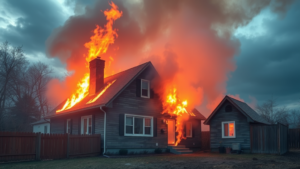Understanding Dwelling Fire Insurance Quotes: Key Components and Coverage Options
When protecting your property against potential fire risks, obtaining a dwelling fire insurance quote is a critical step for homeowners and property owners. Unlike standard homeowners insurance, dwelling fire policies specifically focus on structures that may not qualify for traditional coverage or require specialized protection.
What Defines a Dwelling Fire Insurance Policy?
🚀 Unlock New Opportunities! 🚀
Ready to boost your income, learn new skills, and achieve financial freedom? Explore these highly recommended offers selected just for you!
Fast Wealth
Discover HowLive Chat Jobs - You have to try this one
Start Chatting & Earn!Paid Online Writing Jobs - Get Paid To Do Simple Writing Jobs Online
Get Paid To Write!Cellphone Cash, Over $2 Million spent in testing!
Earn With Your Phone!Writeappreviews.com - Get Paid To Review Apps On Your Phone
Review Apps & Get Paid!InstaDoodle
Explore InstaDoodle!John Thornhills Ambassador Program - OVER 1 MILLION PAID TO JVs SO FAR
Join The Program!Get Paid to be a Virtual Online Assistant - Remote Work Jobs
Become A VA!The GPT Creator Club
Join The Club!A dwelling fire insurance quote covers buildings that are not primary residences, such as:
• Rental properties
• Vacant homes
• Secondary vacation homes
• Seasonal dwellings
• Investment real estate
🚀 Unlock New Opportunities! 🚀
Ready to boost your income, learn new skills, and achieve financial freedom? Explore these highly recommended offers selected just for you!
Fast Wealth
Discover HowLive Chat Jobs - You have to try this one
Start Chatting & Earn!Paid Online Writing Jobs - Get Paid To Do Simple Writing Jobs Online
Get Paid To Write!Cellphone Cash, Over $2 Million spent in testing!
Earn With Your Phone!Writeappreviews.com - Get Paid To Review Apps On Your Phone
Review Apps & Get Paid!InstaDoodle
Explore InstaDoodle!John Thornhills Ambassador Program - OVER 1 MILLION PAID TO JVs SO FAR
Join The Program!Get Paid to be a Virtual Online Assistant - Remote Work Jobs
Become A VA!The GPT Creator Club
Join The Club!These policies provide financial protection against fire-related damages, smoke destruction, and sometimes windstorm or lightning impacts. Property owners often seek these specialized quotes when standard insurance policies won’t adequately address their unique property circumstances.
Essential Coverage Components
When requesting a dwelling fire insurance quote, you’ll encounter several critical coverage options:
Property Structure Protection
This foundational coverage reimburses repair or replacement costs for the building itself if damaged by covered perils. Insurers typically assess the property’s replacement value, which determines your potential compensation.
Personal Property Coverage
While primarily focused on the structure, some policies offer limited personal property protection. This might include furnishings or appliances left in rental units or secondary homes.
Liability Protection
Comprehensive dwelling fire quotes often include liability coverage, protecting property owners from potential legal expenses if someone sustains injuries on the insured property.
Factors Influencing Insurance Quotes
Multiple variables impact your dwelling fire insurance quote:
• Property location
• Building construction materials
• Age of the structure
• Proximity to fire stations
• Previous claims history
• Property occupancy status
• Security system installations
Insurers evaluate these factors to determine risk levels and corresponding premium rates. Properties with higher perceived risks will typically receive higher quotes.
Specialized Quote Considerations
Different property types require nuanced insurance approaches. For instance, a vacant rental property might need more comprehensive protection compared to a seasonal vacation home. Investors managing multiple properties should understand how each location’s unique characteristics influence insurance requirements.
Risk Mitigation Strategies
To potentially reduce your dwelling fire insurance quote, consider:
• Installing smoke detectors
• Implementing fire suppression systems
• Maintaining regular property inspections
• Updating electrical and heating systems
• Clearing potential fire hazards around the property
Obtaining Accurate Quotes
When seeking a dwelling fire insurance quote, prepare comprehensive property information. Detailed documentation including recent property assessments, maintenance records, and specific use cases will help insurers provide more accurate pricing.
Recommended documentation includes:
• Property deed
• Recent professional property appraisal
• Maintenance and renovation records
• Photographs documenting current property condition
Comparison Shopping
Don’t settle for the first quote you receive. Request estimates from multiple insurance providers to ensure competitive pricing. Each insurer uses slightly different risk assessment models, potentially resulting in varied quote prices.
Professional Guidance
Consider consulting an independent insurance agent specializing in dwelling fire policies. These professionals understand intricate policy details and can help navigate complex coverage options tailored to your specific property needs.
By thoroughly understanding dwelling fire insurance quotes, property owners can make informed decisions protecting their valuable real estate investments against potential fire-related risks.
Evaluating Risk Factors That Influence Your Dwelling Fire Insurance Premium
When seeking a dwelling fire insurance quote, understanding the risk factors that impact your premium is crucial. Insurance providers carefully assess multiple elements to determine the potential financial exposure associated with insuring your property. These risk factors significantly influence the cost and coverage of your policy.
Property Location and Environmental Risks
Your home’s geographical location plays a critical role in premium calculations. Insurers evaluate specific regional characteristics that might increase the likelihood of fire or property damage. Key considerations include:
- Proximity to fire stations
- Local wildfire risk zones
- Historical weather patterns
- Crime rates in the neighborhood
- Potential natural disaster vulnerabilities
Structural Characteristics and Building Materials
The physical composition of your dwelling directly impacts fire risk assessment. Insurance companies meticulously examine construction materials, age, and structural integrity. Older homes with outdated electrical systems or wooden frame structures typically attract higher premiums due to increased fire vulnerability.
Construction Material Impact
Homes constructed with fire-resistant materials like brick, concrete, or metal generally receive more favorable insurance rates. These materials demonstrate lower risk potential, translating to reduced premium costs for homeowners.
Safety and Prevention Measures
Implementing robust safety mechanisms can substantially lower your dwelling fire insurance quote. Insurers appreciate proactive risk mitigation strategies that minimize potential damage. Recommended safety enhancements include:
- Installing smoke detectors
- Adding fire extinguishers
- Implementing security alarm systems
- Maintaining proper electrical wiring
- Creating defensible space around the property
Personal Claims History
Your historical insurance claims record significantly influences premium calculations. Individuals with previous fire-related claims or multiple property damage reports might encounter higher insurance rates. Insurers view past claims as potential indicators of future risk.
Credit Score Considerations
Many insurance providers utilize credit-based insurance scores to assess risk. A higher credit score often correlates with lower perceived risk, potentially resulting in more competitive dwelling fire insurance quotes.
Property Usage and Occupancy
How you utilize and occupy your property impacts insurance risk assessment. Vacant or infrequently occupied properties typically attract higher premiums due to increased potential for undetected damage or vulnerability to intentional harm.
Rental Property Dynamics
Investment properties or homes frequently rented out might require specialized coverage. These scenarios introduce additional risk factors that insurers carefully evaluate when generating a dwelling fire insurance quote.
Coverage Limit and Deductible Selections
Your chosen coverage limits and deductible amounts directly influence premium costs. Higher deductibles generally translate to lower monthly premiums, while comprehensive coverage options increase overall insurance expenses.
Risk Mitigation Strategies
Homeowners can strategically manage their insurance costs by understanding these risk factors. Regular property maintenance, implementing safety measures, and maintaining a strong credit profile can help secure more favorable dwelling fire insurance quotes.
By comprehensively understanding these risk assessment elements, you can make informed decisions about your property insurance. Consulting with experienced insurance professionals will provide personalized insights tailored to your specific property characteristics and risk profile.
Key Takeaway:
Key Takeaway: Navigating Dwelling Fire Insurance Quotes with Confidence
Dwelling fire insurance is a critical protection for property owners, offering a specialized form of coverage that goes beyond standard homeowners insurance. The process of obtaining a dwelling fire insurance quote involves understanding complex risk factors and tailored coverage options that can significantly impact your financial security.
When exploring dwelling fire insurance quotes, it’s essential to recognize that these policies are designed for unique property scenarios. Unlike traditional homeowners insurance, dwelling fire policies typically cover properties that may be rental units, vacant homes, or structures with higher risk profiles. The quote you receive will be heavily influenced by multiple critical factors that insurers carefully evaluate.
Risk assessment plays a pivotal role in determining your insurance premium. Insurers conduct a comprehensive analysis of several key elements, including:
Property Characteristics
- Age of the building
- Construction materials
- Proximity to fire stations
- Electrical and plumbing system conditions
- Overall property maintenance
Location-Based Risk Factors
- Geographic area prone to natural disasters
- Crime rates in the neighborhood
- Wildfire or flood risk zones
- Proximity to potential hazards
Property Usage
- Rental vs. owner-occupied status
- Frequency of occupancy
- Purpose of the property (residential, investment, etc.)
The most comprehensive dwelling fire insurance quotes will provide multiple coverage options tailored to your specific needs. These typically include:
- Structure protection
- Limited personal property coverage
- Liability protection
- Additional living expenses
- Specialized endorsements for unique risks
Potential property owners should approach obtaining a dwelling fire insurance quote as a strategic decision. It’s not just about finding the lowest price, but securing comprehensive protection that addresses your specific property risks.
Proactive steps to potentially lower your quote include:
- Implementing safety upgrades
- Maintaining excellent property condition
- Installing security systems
- Improving fire prevention measures
- Bundling multiple insurance policies
By understanding the intricate details that influence your dwelling fire insurance quote, you can make informed decisions that protect your investment while potentially reducing your overall insurance costs. Each quote is a personalized assessment of risk, requiring careful consideration and strategic planning.
Remember, the cheapest quote isn’t always the best. Focus on finding a balance between comprehensive coverage and affordable premiums that truly protect your property’s unique characteristics and potential vulnerabilities.
Conclusion
Securing the right dwelling fire insurance quote requires careful consideration of multiple factors and a comprehensive understanding of your property’s unique risks. By thoroughly examining coverage options and evaluating potential risk elements, homeowners can craft a robust insurance strategy that provides financial protection and peace of mind.
Your journey to finding the ideal dwelling fire insurance policy involves more than just comparing prices. It demands a holistic approach that balances comprehensive coverage with affordable premiums. Recognize that each property presents distinctive challenges, and insurance providers assess risk through a nuanced lens that considers location, construction type, proximity to fire stations, and historical claim data.
Smart homeowners invest time in understanding their specific insurance needs. This means not just accepting the first quote you receive, but actively engaging with insurance professionals who can help you customize a policy that truly reflects your property’s characteristics and potential vulnerabilities.
Remember that proactive risk management can significantly impact your insurance costs. Simple steps like installing fire prevention systems, maintaining your property, and improving security features can translate into more favorable insurance quotes. These strategic investments not only protect your dwelling but can also lead to meaningful premium reductions.
Ultimately, a well-chosen dwelling fire insurance quote is more than a financial transaction—it’s a critical shield protecting your most valuable asset. By approaching the process with knowledge, diligence, and strategic thinking, you can secure comprehensive coverage that offers genuine financial security and emotional reassurance.
Take the time to research, ask questions, and work closely with insurance professionals who understand the intricacies of dwelling fire insurance. Your informed decisions today can prevent substantial financial challenges tomorrow.




